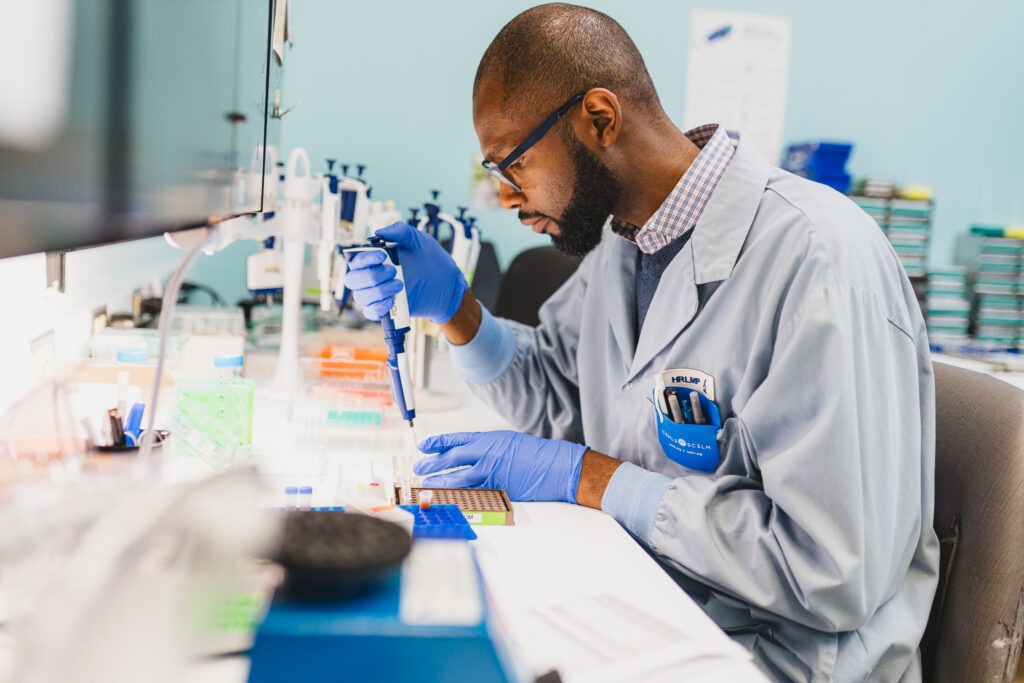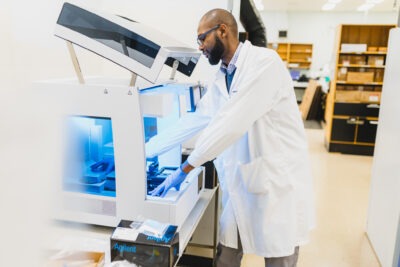
Lemuel Pitters is a technical specialist at our genetics lab, located at McMaster University Medical Centre. Here, Pitters adds chemicals to DNA samples in preparation for loading a Next Generation Sequencing (NGS) instrument, which reads DNA sequences from samples.
Hamilton Regional Laboratory Medical Program
Some of the most familiar faces to patients are their Hamilton Health Sciences (HHS) doctors and nurses.
But behind the scenes, thousands of other HHS health-care professionals play vital roles in patient care including lab staff, whose work touches nearly every patient at HHS as well as other patients across the region and even provincially.
Lab staff are part of the Hamilton Regional Laboratory Medical Program (HRLMP), a partnership between HHS and St. Joseph’s Healthcare Hamilton. The HRLMP is one of the largest such lab service programs in the country consisting of 30 labs across both hospitals with over 700 team members.
Law enforcement path leads to health care
Back in high school, Lemuel Pitters dreamed of a career solving criminal mysteries in a forensic crime lab. He lay solid groundwork for this career, earning a bachelor of forensic science at the University of Windsor. But when jobs in forensics proved scarce, Pitters shifted his focus to health care and attended the Michener Institute in Toronto to earn an advanced diploma in genetics technology.

Lemuel Pitters, technical specialist with the genetics lab at HHS McMaster University Medical Centre.
Only two schools in Canada offer genetics technology programs in cytogenetic and molecular genetics – the Michener Institute and the British Columbia Institute of Technology – so it’s a highly specialized field.
Shortly after his graduation from the Michener Institute, Pitters launched his Hamilton Health Sciences career in the genetics lab at our McMaster University Medical Centre (MUMC). Pitters worked as a medical laboratory technologist specializing in cytogenetics and molecular genetics before taking on his current role as a technical specialist with the lab. This role includes coordinating multiple projects; writing reports, protocols and standard operating procedures; and reviewing data for test validations.
“Within genetics, especially in last couple of years, there has been a great deal of advancement.”
“My shift to health care was a blessing in disguise,” says Pitters, who takes deep satisfaction in knowing that the lab helps many thousands of patients across the region and beyond. “With law enforcement, I would have been involved in investigations after the fact, but with health care I’m being proactive in helping people maintain and improve their health.”
MUMC genetics lab
The genetics lab is part of the Hamilton Regional Laboratory Medical Program (HRLMP), and its two areas of focus are cytogenetic and molecular genetic testing. Cytogenetics is the study of chromosomes while molecular genetics studies genes at the DNA sequence level. Cytogenetics and molecular genetic testing share the same lab space and it’s common for some lab techs to work in both areas.
Cytogenetic and molecular genetics

Lemuel Pitters adds DNA samples and chemicals into the Magnis NGS Prep System, a fully automated next-generation sequencing library preparation system that’s designed to prepare DNA samples for a Next Generation Sequencing instrument. It’s the first unit of its kind in Canada, and the genetics lab is testing it to see if it’s something they would like to bring to HHS.
Cytogenetic lab work provides chromosome testing, such as checking blood and bone marrow samples for certain differences common in cancers and running prenatal tests to identify fetal abnormalities.
“With cytogenetics, we’re examining the chromosomes of individual patients,” says Pitters. “We’re seeing samples covering the entire life cycle – from patients not even born yet right up to someone in their nineties or older.”
Molecular genetics lab work provides expertise in molecular genetic testing for congenital disorders and certain cancers. “On the molecular side we’re working with actual DNA or RNA sequences,” says Pitters. “So instead of looking at chromosome structure, we’re going further and looking at the actual DNA or RNA sequence.”
Rapid advancements in genetics field
“Within genetics, especially in last couple of years, there has been a great deal of advancement,” says Pitters. “For example, genetic disorders in some cancerous tumours can indicate if the disease will respond well to certain drugs, which can lead to more effective treatments.”
Pitters’ work includes keeping abreast of new technologies in the rapidly advancing field of genetics.
“While we don’t conduct research in this lab, we stay up-to-date on new research and technologies that we could potentially implement to help our patients.”
Extremely fulfilling career
Most lab staff don’t work directly with patients, yet they have deep insight into who patients are and what makes them unique through the samples they examine.
“You quickly learn to appreciate how similar everyone in this world is in terms of genetics, and how it’s the small things that make us so diverse,” says Pitters.
“In health care, we touch the lives of so many people. It’s extremely fulfilling, and with so many labs at the HRLMP there’s something for everyone interested in pursuing a career in health-care related lab work.”
For more information about HHS careers, including job listings, please visit the careers page.
Related Posts
https://news.google.com/rss/articles/CBMiS2h0dHBzOi8vd3d3LmhhbWlsdG9uaGVhbHRoc2NpZW5jZXMuY2Evc2hhcmUvZnJvbS1jcmltZS1sYWItdG8taG9zcGl0YWwtbGFiL9IBAA?oc=5
2023-07-14 12:26:10Z
CBMiS2h0dHBzOi8vd3d3LmhhbWlsdG9uaGVhbHRoc2NpZW5jZXMuY2Evc2hhcmUvZnJvbS1jcmltZS1sYWItdG8taG9zcGl0YWwtbGFiL9IBAA
Tidak ada komentar:
Posting Komentar